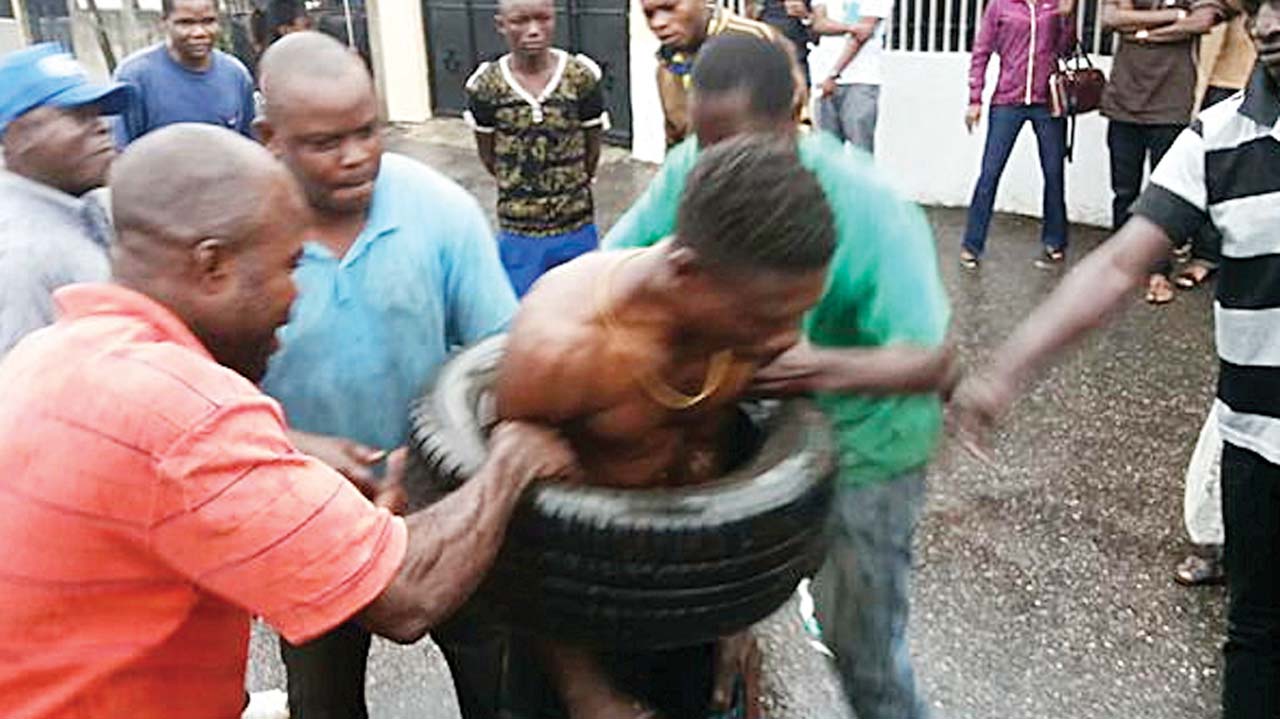The unacceptable spate of jungle justice in Nigeria
Only in May 2022, 32 cases of jungle justice were reported in Nigeria. Most of these mob actions have resulted in gruesome, inhumane torture and extra-judicial killing of people accused of committing an offence. Dozens have suffered death through beatings or burning. The recent lynching of David Imoh in Lagos has once again centred jungle […]

Only in May 2022, 32 cases of jungle justice were reported in Nigeria. Most of these mob actions have resulted in gruesome, inhumane torture and extra-judicial killing of people accused of committing an offence. Dozens have suffered death through beatings or burning.
The recent lynching of David Imoh in Lagos has once again centred jungle justice in the national discourse, leading to concerned citizens calling on authorities to make committed efforts to end this barbarous practice.
Mob actions have had a long history and predate Nigeria. It was pervasive in the United States as a tool white America used in terrorising its black population. This system of extra-judicial execution sometimes based on false accusations, such as the case of the Aluu 4, or on flimsy arguments like the dispute over a N100 change that cost Mr Imoh his life in Lagos, has become the bane of the Nigerian state and its woeful justice system.
Between 2020 and 2021, nearly 200 persons lost their lives in reported cases of jungle justice in Nigeria, according to a report by the Daily Trust newspaper. This figure documents only cases that have been reported in the media. While 83 deaths were recorded in 2020, the figure rose to 107 the following year. With rising hate, rising poverty and a staggering failure of the law and justice system in the country fears that the numbers will increase for 2022 are not misplaced.
In several instances, mobs have opted to dish out this form of justice because they mistrusted the law, law enforcers and the justice process. This largely stems from a lack of diligent investigation and prosecution of suspects, the complicity of law enforcement in suspects’ escape from justice and the painfully slow wheels of justice in Nigeria with court cases dragging for years while thousands of suspects await trial.
The cases have been exacerbated by state-sanctioned extra-judicial killings. In the early 2000s, state-backed vigilantes in the southeast, otherwise called Bakassi Boys, went on a public lynching spree of suspects after they were given a free rein by the governors in the region to help curb crime. It was the clearest demonstration of the failings of the justice system up to that point.
While these extra-judicial killings often drag out for hours, it beggars belief that the police are hardly ever at hand to stop them. In other instances, it would appear the police directly sanction the killings.
Miss Ibisobia Elkannah for instance, witnessed the murder of her own brother and his friends in Aluu, Rivers State, in 2012, when on a visit to a friend she heard a commotion outside. Upon investigation, she found her brother and three others being tortured by a crowd for alleged robbery, a false accusation from a debtor they had gone to collect money from. Her attempts to speak for her brother led to direct threats against her own life and in an interview, she recounts how the police arrived at the scene, talked with the mob and then drove off laughing, just before her brother and his friends were burnt alive.
The increasing spread of jungle justice in the country and recourse to it is a clear signal for authorities to wake up to their responsibility of ensuring law and order and upholding justice. These actions, if left unchecked, could trigger widespread conflicts, as demonstrated in the Dei-Dei market recently, where reckless driving and lynching led to a violent confrontation between different groups. The resultant deaths and losses in business may seem small compared to other violent clashes in the country, but it is a warning of the anarchy to come if this dangerous impulse is not contained.
The authorities must draw a line in the sand and make clear examples of recent incidents by diligently hunting down leaders of such ravenous mobs, and making a public example of their trial and sentencing. This should serve as a deterrent to others.
In the short term, the public information organs of the government must create and design a campaign to sensitize Nigerians, through TV, radio, social media and face-to-face engagements at markets, motor parks and other spots, on how to report offenders, handle them and surrender them to the authorities.
In the medium term, civic education and human rights must be properly taught in schools and through public awareness campaigns.
While these steps are crucial, authorities must do the most important aspect on their part. This is to bolster the police to provide adequate security cover to the country, train and retrain the police on suspect handling in a fair, just and transparent fashion, and the importance of being accountable to the people they are sworn to protect. The justice system as a whole must be reformed to deliver justice with a swift and steady hand and in a transparent manner that will remove doubt from the minds of citizens and engender trust in the process.
Authorities must act now before these extra-judicial killings and self-help ‘justice’ snowball into a dangerous avalanche that could consume thousands of lives and lead to a complete breakdown of law and order.
